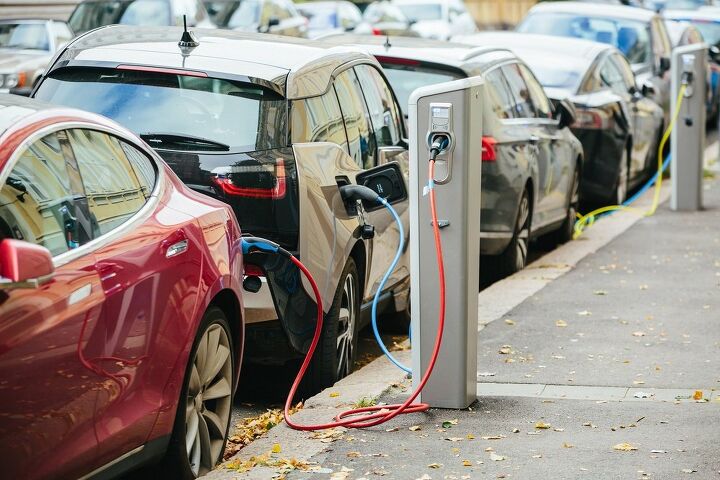J.D. Power: Totally Changing Society Hasn't Made People Want Electric Vehicles

Despite governments the world over practically forcing electric vehicles down our collective throat via stringent emission standards, the average person living in North America hasn’t changed their mind on them. According to a recent survey by J.D. Power, the “Mobility Confidence Index” for battery-electric vehicles remains largely neutral.
Even as global lockdowns have made them a more viable option, with more people working from home and driving fewer miles every week, North Americans aren’t budging. In fact, citizens of the United States may actually be turning on EVs while Canadians remain slightly more agreeable — something that probably extends beyond the automotive realm.
Attributing a “lack of education” as the core reason people aren’t embracing every concept you’d like them to has become so commonplace in 2020 that we’re not even going to bother taking the claim seriously. The automotive industry has been using it as the default excuse for why people aren’t buying EVs in droves for years — often ignoring the very real issues of range anxiety, extended charging times, and higher-than-average pricing. Frankly, it seems like teaching people about electric cars is the best way to convince some not to buy one. That might become a serious issue as North America is estimated to see roughly 100 brand new EVs by the year 2024.
To its credit, J.D. Power did not exclusively focus on the false premise that people are just too stupid to want to buy electric vehicles and ultimately addressed concerns of battery range:
More U.S. consumers are expressing a desire for battery-electric vehicles to have a greater range, while having less patience to wait for their vehicle to charge. More than three-fourths of respondents expect a range of 300 miles or more, up three percentage points from 2019 Q3. The percentage of U.S. respondents willing to wait only 15 minutes or less to charge the vehicle to travel 200 miles has increased to 45 [percent] from 41 [percent] in 2019 Q3. Nearly four in five Canadians express a driving range preference of 450 kilometers or more, while 47 [percent] are willing to wait only 15 minutes or less to charge the vehicle to travel about 300 kilometers.
Canadians’ lowered expectations also seemed to make them more inclined to consider buying electric in general. Having surveyed around 9,000 “consumers and industry experts” in September with help from SurveyMonkey, J.D. Power found its Mobility Confidence Index for battery-electric vehicles decreasing among American drivers to 54 from 55 (on a 100-point scale) while increasing among Canadian drivers to 58 from 57. The self-driving index was even lower, dropping to 34 (from 35) in the United States with Canada remaining at 36.
Despite our belief that educating people on EVs probably wouldn’t move the needle more than a hair, direct experience might make them seem a little less ominous. The survey showed that roughly two-thirds of motorists had no first-hand experience with electric cars. Familiarizing consumers with EVs will probably take the edge off some of the presumed nervousness but only if the vehicles being tested actually suits their needs. While better (and cheaper) products are incoming, there are plenty of EVs retailing over $50,000 today that are incapable of making 300-mile round trips without stopping for a recharge. A lot of people will hop into one of those and admire the experience before opting for something less expensive, more utilitarian, and driven by gasoline.
But there’s genuine hope for electric vehicles to turn the tide. Despite the lower-than-anticipated interest, EVs will continue providing consumers with opportunities to familiarize themselves as they get increasingly better and more common. Meanwhile, autonomous vehicles seem to have freaked everyone out. According to the study, only 14 percent of people who drive a personal vehicle in the U.S. feel comfortable riding in self-driving cars.
“At the outset of the pandemic, there was uncertainty on the implications of consumer preferences, but the data tell us that attitudes on self-driving and electric vehicles have not changed,” said Jon Cohen, chief research officer at SurveyMonkey. “We continue to see that younger American have the most positive views of both self-driving and electric vehicles. Canadians also continue to have more positive views than Americans.”
While autonomous vehicles remain in reverie, around 13 percent of respondents said they’d seriously be considering buying an EV before 2022. But 30 percent said they’d probably never buy one, making the light at the end of the electric tunnel look faint. We’re inclined to believe this isn’t so much an issue with consumers but the ridiculous goals being set by governments and the automotive industry.
The industry is supposed to cater to the customer, not some new economy planned by government decree — that’s how you get turds like the Yugo 45 and Moskvitch 412. Once EVs have proven themselves superior to internal combustion vehicles and get a truly comprehensive charging grid, they’ll begin selling like hotcakes used to whenever they were wildly popular. But remaining constantly annoyed that legacy automakers can’t supply the market with electric products people will bend over backward for is why Tesla is making everyone else look like they arrived late and bitter to a party held specifically in their honor. Elon Musk and Co are actually building cars people want to buy, so they’re selling and have continued to sell as subsidies are exhausted. We know governments are mandating efficiency quotas and the green movement is deafeningly loud but it takes time to sway public opinion on a global scale. That 30 percent claiming they’ll never buy an EV may even change their minds if the next batch going into production proves to be dramatically better than their predecessors.
[Image: Scharfsinn/Shutterstock]

A staunch consumer advocate tracking industry trends and regulation. Before joining TTAC, Matt spent a decade working for marketing and research firms based in NYC. Clients included several of the world’s largest automakers, global tire brands, and aftermarket part suppliers. Dissatisfied with the corporate world and resentful of having to wear suits everyday, he pivoted to writing about cars. Since then, that man has become an ardent supporter of the right-to-repair movement, been interviewed on the auto industry by national radio broadcasts, driven more rental cars than anyone ever should, participated in amateur rallying events, and received the requisite minimum training as sanctioned by the SCCA. Handy with a wrench, Matt grew up surrounded by Detroit auto workers and managed to get a pizza delivery job before he was legally eligible. He later found himself driving box trucks through Manhattan, guaranteeing future sympathy for actual truckers. He continues to conduct research pertaining to the automotive sector as an independent contractor and has since moved back to his native Michigan, closer to where the cars are born. A contrarian, Matt claims to prefer understeer — stating that front and all-wheel drive vehicles cater best to his driving style.
More by Matt Posky
Latest Car Reviews
Read moreLatest Product Reviews
Read moreRecent Comments
- 6-speed Pomodoro I had summer and winter tires for a car years ago. What a pain in the butt. You've permanently got a stack of tires hogging space in the garage and you've got to swap them yourself twice a year, because you can't fit a spare set of tires in a sportscar to pay someone else to swap 'em.I'd rather just put DWS06's on everything. But I haven't had a sportscar in 8 years, so maybe that's a terrible idea.
- ShitHead It kicked on one time for me when a car abruptly turned into my lane. Worked as advertised. I was already about to lean into the brake as I was into the horn.
- Theflyersfan I look at that front and I have to believe that BMW and Genesis designers look at that and go "wow...that's a little much." Rest of the car looks really good - they nailed the evolution of the previous design quite well. They didn't have to reinvent the wheel - when people want a Mustang, I don't think they are going to cross-shop because they know what they want.
- Theflyersfan Winters go on around Halloween and Summers go on in late March or early April. However, there were some very cold mornings right after the summers went on that had me skidding a bit due to no grip! I do enough (ahem) spirited driving on empty hilly/mountain roads to justify a set of sticky rubber, and winters are a must as while there isn't much snow where I am (three dustings of snow this entire winter), I head to areas that get a bit more snow and winter tires turns that light, RWD car into a snow beast!
- SCE to AUX My B5.5 was terrible, but maybe the bugs have been worked out of this one.

































Comments
Join the conversation
You won't be able to change American minds or rather the idea that "electric is better". They already made up their minds on liking Chevy vs Fords, gas, diesel, hybrids and other fuel sources. You still have the same people say electric vehicles are slow. I have my own reasons why I won't ever buy an EV like others. Batteries is the biggest reason, with the longevity being shorter than 7 years. Some people have stated dealers have said it'll cost over $15,000 to replace because they say replacements are on short supply then offer the latest model for $30,000. Its among the different reasons I won't buy one, next to I don't want to be forced into electric and I don't make enough money and it's cheaper to fix my own gasoline vehicles than worrying over how much money I'll need to replace the battery or the car. Many others have similar mindsets. Forcing electric vehicles will just make people more upset and you won't get anywhere but more unrest. Seeing there is so many against electric vehicles the "electric revolution" may never happen.
You won't be able to change American minds or rather the idea that "electric is better". They already made up their minds on liking Chevy vs Fords, gas, diesel, hybrids and other fuel sources. You still have the same people say electric vehicles are slow. I have my own reasons why I won't ever buy an EV like others. Batteries is the biggest reason, with the longevity being shorter than 7 years. Some people have stated dealers have said it'll cost over $15,000 to replace because they say replacements are on short supply then offer the latest model for $30,000. Its among the different reasons I won't buy one, next to I don't want to be forced into electric and I don't make enough money and it's cheaper to fix my own gasoline vehicles than worrying over how much money I'll need to replace the battery or the car. Many others have similar mindsets. Forcing electric vehicles will just make people more upset and you won't get anywhere but more unrest. Seeing there is so many against electric vehicles the "electric revolution" may never happen.